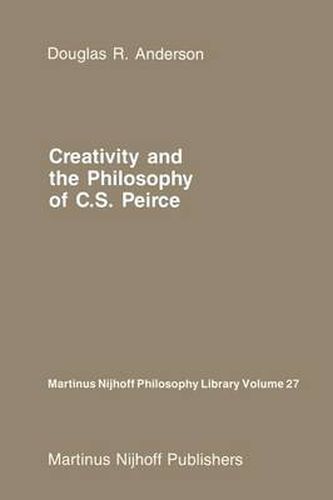Readings Newsletter
Become a Readings Member to make your shopping experience even easier.
Sign in or sign up for free!
You’re not far away from qualifying for FREE standard shipping within Australia
You’ve qualified for FREE standard shipping within Australia
The cart is loading…






This title is printed to order. This book may have been self-published. If so, we cannot guarantee the quality of the content. In the main most books will have gone through the editing process however some may not. We therefore suggest that you be aware of this before ordering this book. If in doubt check either the author or publisher’s details as we are unable to accept any returns unless they are faulty. Please contact us if you have any questions.
Charles Sanders Peirce is quickly becoming the dominant figure in the history of American philosophy. The breadth and depth of his work has begun to obscure even the brightest of his contemporaries. Concerning the interpretation of his work, however, there are two distinct schools. The first holds that Peirce’s work is an aggregate of important but disconnected insights. The second school argues that his work is a systematic philosophy with many pieces of the overall picture still obscure or missing. It is this second view which seems to me the most reasonable, in part because it has been convincingly defended by other scholars, but most importantly because Peirce himself described his philosophy as systematic: What I would recommend is that every person who wishes to form an opinion concerning fundamental problems should first of all make a complete survey of human knowledge, should take note of all the valuable ideas in each branch of science, should observe in just what respect each has been successful and where it has failed, in order that, in the light of the thorough acquaintance so attained of the available materials for a philosophical theory and of the nature and strength of each, he may proceed to the study of what the problem of philosophy consists in, and of the proper way of solving it (6. 9) [1].
$9.00 standard shipping within Australia
FREE standard shipping within Australia for orders over $100.00
Express & International shipping calculated at checkout
Stock availability can be subject to change without notice. We recommend calling the shop or contacting our online team to check availability of low stock items. Please see our Shopping Online page for more details.
This title is printed to order. This book may have been self-published. If so, we cannot guarantee the quality of the content. In the main most books will have gone through the editing process however some may not. We therefore suggest that you be aware of this before ordering this book. If in doubt check either the author or publisher’s details as we are unable to accept any returns unless they are faulty. Please contact us if you have any questions.
Charles Sanders Peirce is quickly becoming the dominant figure in the history of American philosophy. The breadth and depth of his work has begun to obscure even the brightest of his contemporaries. Concerning the interpretation of his work, however, there are two distinct schools. The first holds that Peirce’s work is an aggregate of important but disconnected insights. The second school argues that his work is a systematic philosophy with many pieces of the overall picture still obscure or missing. It is this second view which seems to me the most reasonable, in part because it has been convincingly defended by other scholars, but most importantly because Peirce himself described his philosophy as systematic: What I would recommend is that every person who wishes to form an opinion concerning fundamental problems should first of all make a complete survey of human knowledge, should take note of all the valuable ideas in each branch of science, should observe in just what respect each has been successful and where it has failed, in order that, in the light of the thorough acquaintance so attained of the available materials for a philosophical theory and of the nature and strength of each, he may proceed to the study of what the problem of philosophy consists in, and of the proper way of solving it (6. 9) [1].